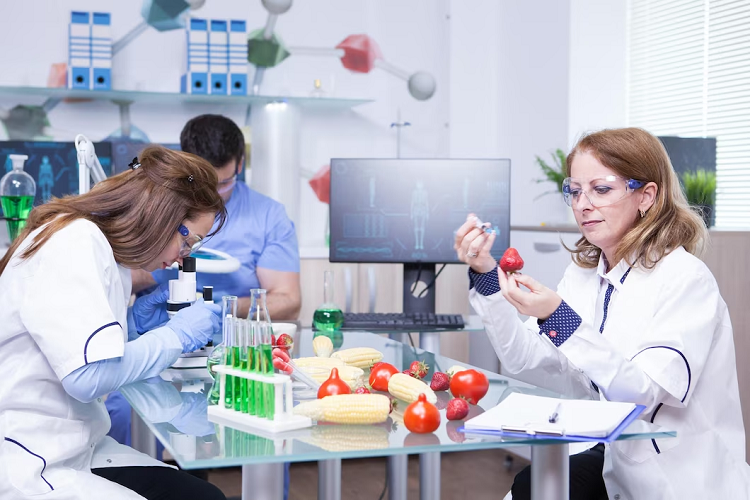Chemistry graduates have a wide range of job opportunities in the food industry. Food chemists can work in research and development, quality assurance and control, production or safety management roles within companies such as food processing plants, restaurants or government agencies.
The food and beverage industry is one of the most lucrative and fastest-growing sectors in the world. According to a report by Fortune Business Insights, the functional food and beverage market is expected to experience significant growth from $281.14 billion in 2021 to $529.66 billion in 2028, with a Compound Annual Growth Rate (CAGR) of 9.5%.
The rising demand for nutritious food because of a hectic lifestyle and growing awareness of health benefits among people are driving the market’s growth.
Chemistry Graduates: Job Opportunities in Food Industry
The rise of this industry has also created an abundance of job opportunities for chemistry graduates looking to start a career in food and beverage science. Here are some career options for chemistry graduates that are available within this field:
Food Quality Analyst
Food quality analysts are responsible for analyzing food products to ensure that they meet the required standards of quality. They also test products to ensure they do not contain harmful substances, such as pesticides or preservatives.
To perform this role successfully, you will need a degree in general chemistry, knowledge of analytical methods and equipment, an eye for detail when examining samples under a microscope, and the ability to work well with others on teams who may have different specialties (e.g., microbiologists).
To start, you can enroll in a course in general chemistry at your local university and get help from general chemistry online learning programs. Online learning can provide several benefits for individuals interested in pursuing a career in the food and beverage industry. It can help them develop a foundational understanding of chemistry concepts and laboratory skills that are crucial for success in the industry.
Additionally, online learning can provide flexibility and convenience, allowing learners to study at their pace and on their own schedule. Platforms like Proprep offer comprehensive General Chemistry courses that cover all necessary concepts and offer interactive learning experiences to enhance the learning process. They also offer a 14-day free trial of the course that can help you make your decision about joining the program.
Food and Beverage Chemist
Food and beverage chemistry professionals analyze the chemical composition of foods and beverages, identify changes in quality that may occur during processing or storage, and develop methods to prevent or correct these changes. They also study how different food additives affect taste and texture as well as their physiological effects on humans.
The typical education required for this occupation is a bachelor’s degree in chemistry or biochemistry. Many employers prefer applicants who have taken additional courses in food science or engineering at the graduate level. However, it is not always necessary to have a higher qualification or an extensive experience in this field.
According to Zippia, on average, food chemists in the United States earn an annual salary of $62,727 or an hourly rate of $30.16. The bottom 10% of food chemists earn approximately $44,000 per year, while the top 10% earn $87,000.
The salary of a food chemist can vary depending on their location, with those working in Delaware, Washington, Vermont, New Jersey, and Oklahoma earning the highest salaries in the profession.
Food Product Research and Development Chemist
Food product research and development chemists are responsible for developing new foods and beverages. They work in laboratories, where they test out different ingredients, products, and techniques to create new products that people will enjoy. A food product research and development chemist needs to be able to work under pressure, as well as keep an open mind to new ideas.
To become a food product research and development chemist:
- Earn a bachelor’s degree in chemistry.
- Take additional courses, such as organic chemistry classes at an accredited university program.
Regulatory Compliance Chemist
A regulatory compliance chemist works with food and beverage manufacturers to ensure that their products are safe for consumption. This can involve analyzing data, conducting research, and developing new processes. A regulatory compliance chemist might also work closely with regulatory agencies such as the Food and Drug Administration (FDA) or Environmental Protection Agency (EPA).
The ideal candidate will have a bachelor’s degree in chemistry or biology and at least some years of laboratory experience working with chemicals related to food safety standards.
Quality Control Technician
As a quality control technician (QCT), you’ll be responsible for testing the quality of food and beverages at all stages of production. This may include examining raw materials, monitoring equipment during processing and packaging, inspecting finished goods before they leave the factory or warehouse, or conducting tests on samples taken from products in stores.
Your duties might also include training new employees on proper procedures for handling ingredients and chemicals, as well as performing routine maintenance on equipment like mixers and blenders.
In addition to their technical skillset in chemistry or related fields such as biochemistry/biotechnology/microbiology/bioscience etc., QCTs must be able to keep detailed records about their workday activities so that problems can be identified quickly if any arise later on down the line.
This includes keeping regular logs about everything from temperature measurements taken during fermentation processes up through final product testing before being shipped off to stores where consumers buy them.
Quality Engineer
If you’re a chemistry graduate who wants to work in the food and beverage industry, quality engineering is one of the most popular career paths. The food and beverage industry is a large and growing market with many job opportunities for professionals who want to work with products that people consume daily.
Quality engineers are tasked with ensuring that products are fit for their intended purpose by applying scientific principles and methods. They can be found in manufacturing, process development (making sure things are done correctly), product development (coming up with new ways of making things), as well as working in quality assurance or control departments within companies.
Conclusion
According to the U.S. Bureau of Labor Statistics, employment in the food and beverage industry is predicted to increase by 9% from 2021 to 2031, surpassing the average growth rate for all professions. On average, around 955,100 job openings for these workers are expected to become available each year over the next decade.
Many of these openings will arise due to the replacement of workers who switch to other professions or leave the workforce for reasons such as retirement.
If you’re a chemistry graduate looking for a job opportunities in the food and beverage industry, there are many areas in which your skills can be put to use. From food science research and development to quality control and analysis, there are plenty of job opportunities available for anyone interested in pursuing this line of work.
Chemistry graduates may be employed by universities to conduct research on topics related to nutrition science or develop new products using their knowledge of ingredients’ chemical properties. With an understanding of both chemistry principles and food technology processes, these professionals are highly sought after by employers looking to create safe products while improving upon existing ones.




